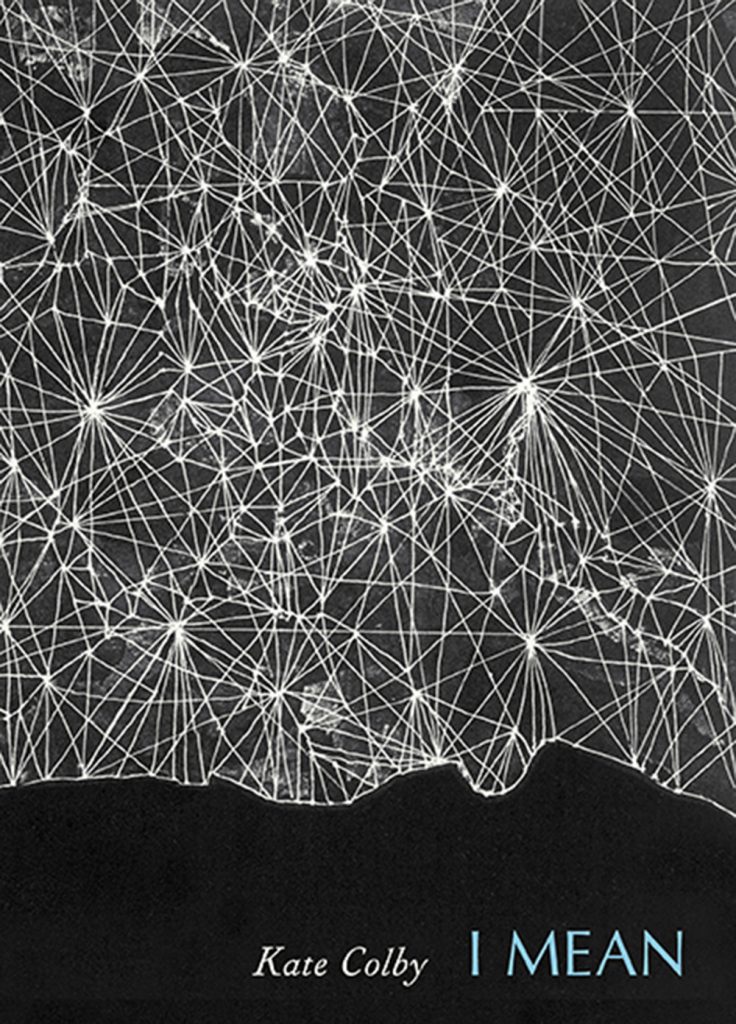If there’s a theme to this work, it’s reflexiveness. If there’s a general impetus, it’s a would-be completism. I chip away at, as well as with, the words of which I am made for the momentary thrill of cracking through to the other side of my language-delimited self and getting a glimpse of the extra-linguistic conditions that might exist there—some kind of vestigial memory or form of perception that can’t be caught with words. But I have a sense that I can only get there by saying—exhausting myself via words, exhausting words.

I Mean
Kate Colby
June 2015
Like Scheherazade pulling beginnings out of the middles of stories to save her own life
Darcie Denningan & Kate Schapira
Kate Colby’s sixth book is a personal ars poetica that looks back on her previous work and asks what she meant to say, what she keeps meaning to, and how to mean more. In a long, cumulative poem and a collection of lyric essays she explores how meaning is made and denied in and by art and language, effecting an urgent movement toward meaning with hope for no hope for arrival.
Cover art: “Montana Night” by Victoria Burge
About the Author
Kate Colby is the author of six books of poetry, including three books with Ugly Duckling Presse: I Mean (2015), The Return of the Native (2011), and Unbecoming Behavior (2008). The Arrangements is forthcoming from Four Way Books in 2018. Her first book, Fruitlands (Litmus), won the Norma Farber First Book Award and she has received fellowships from RI State Council for the Arts and Harvard’s Woodberry Poetry Room. A founding board member of the Gloucester Writers Center in Massachusetts, she currently lives in Providence.
Praise
In this stunning collection of poetry and lyric essay, Kate Colby ruminates iteratively, almost recursively over questions of scale and knowability: “The scale of language is human, and humans do not exist on a comprehensive scale.” The title poem uses a series of “I mean” statements (“I mean it’s major // I mean in motion // I mean pictures”) in a performance of clarification, but the accumulation of contradictory meanings (“self-supplanting palimpsests”) disrupts the text’s ability to mean anything stable; standalone attempts at meaning become, en masse, a conceptual inquiry into semantics. Colby grasps again and again at the ineffable or rather the almost-effable—she does not want to capture X so much as to convey X through the grasping itself, to circumscribe what can’t be expressed. At times, she achieves this so spectacularly—in “moments of euphoric clarity”—it makes me want to cry.
Elisa Gabbert
Like Scheherazade pulling beginnings out of the middles of stories to save her own life, I Mean denies its readers endings. Instead, its equations, erupting into multiple registers and digressions, which it constantly longs to contain and constantly fails to contain, give us opportunities: to argue with our own language, trace our own deferrals, and wonder, if a definitive ending or answer were to arrive, what we would do with it. Constant qualifications impede the “then” of I Mean's “if's”, and never solving them helps the reader learn to listen and the speaker survive, by any means necessary.
Darcie Denningan & Kate Schapira
Using its title anaphoristically and clocking in at nearly 70 pages, the title poem is a tight, nimble, and wide-ranging work that manages to, in the author's words, "pile words up/ and wrap the referents around them" in a remarkably fun and conceptually virtuosic way. The essays also display an erudition that can be both heady and playful… With verve and purpose, Colby plays trick after alluring trick to write herself in and out of meaning.
Publishers Weekly
In the News
Links
Publication Details
ISBN: 978-1-937027-45-2
Trade Paperback
Perfect-bound. 128 pp, 5.75 x 8 in
Publication Date: June 01 2015
Distribution: Asterism Books (US)